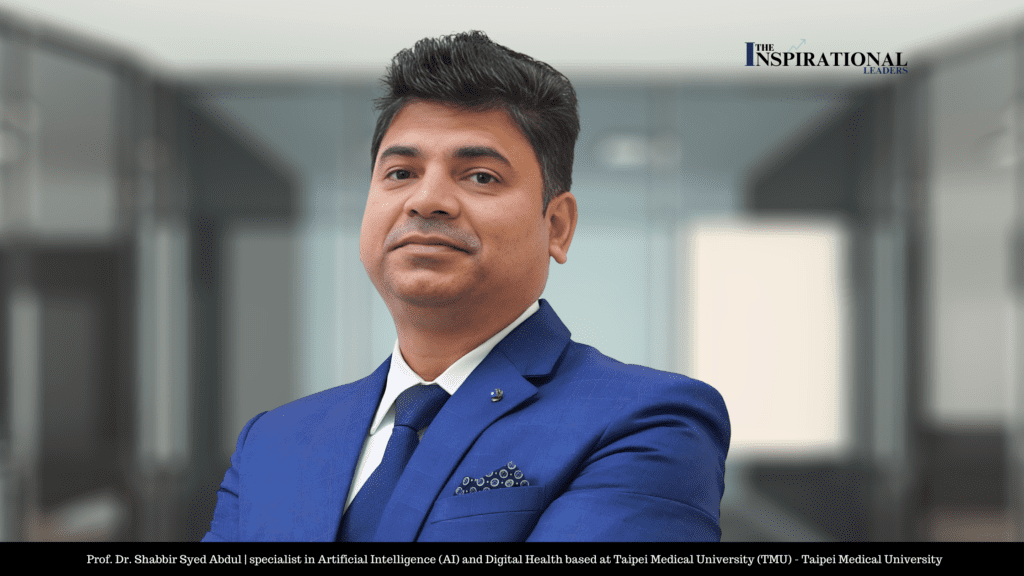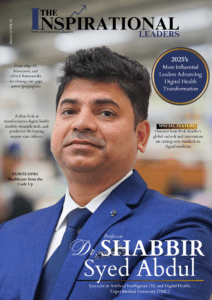In the rapidly evolving landscape of healthcare, digital transformation stands as a beacon of hope and innovation, promising to improve patient outcomes, increase accessibility, and reduce costs. Among the pioneering figures shaping this transformation is Prof. Dr. Shabbir Syed Abdul is a prominent specialist in Artificial Intelligence (AI) and Digital Health based at Taipei Medical University (TMU) in Taiwan. With a career spanning cutting-edge research and hands-on implementation, Prof. Shabbir embodies the forefront of how AI, quantum computing, and digital technologies converge to redefine healthcare for the 21st century.
Prof. Dr. Shabbir Syed Abdul’s contributions to the fields of artificial intelligence and digital health are not just commendable—they are globally recognized. Ranked among the top 2% of scientists in the world by Stanford University, his work stands at the forefront of medical innovation. With a remarkable citation record on Google Scholar, his research continues to shape the way healthcare systems evolve, particularly in the areas of digital transformation, aging populations, and data-driven medical interventions. His academic influence stretches far beyond institutional boundaries, reflecting a vision grounded in impact, relevance, and forward-thinking discovery.
Digital Health in Taiwan: A Model for the World
Taiwan offers a unique and inspiring example of how an advanced digital health ecosystem can be developed and integrated within a comprehensive healthcare system. According to Prof. Shabbir, the island’s health system benefits from a universal healthcare coverage model combined with a rapidly maturing digital infrastructure. This synergy has facilitated the swift adoption of AI-driven smart healthcare solutions, especially noticeable during the COVID-19 pandemic, which acted as a catalyst for digital health expansion worldwide.
During the 2025 World Health Assembly, Taiwan successfully hosted a “Smart Medicine Forum” on the sidelines of the event. The forum showcased Taiwan’s advancements in smart healthcare technologies, including AI-assisted diagnostics, smart hospital systems, and wearable health monitoring devices—highlighting the nation’s growing integration of AI, telemedicine, and digital health solutions. Data from Taiwan’s National Health Insurance (NHI) indicates that demand for healthcare services is rising, and the adoption of digital health solutions is helping to meet this demand while expanding access to care.
Prof. Shabbir emphasizes that the widespread use of wearable technology such as smartwatches and biosensors, coupled with edge AI — which enables localized data processing at the device level — is reshaping how health data is captured and utilized. These devices currently offer instantaneous tracking of vital signs, long-term health conditions, and wellness indicators with exceptional speed and precision.
AI and Quantum Computing: The Next Frontier
While AI has already begun transforming diagnostics, treatment planning, and patient monitoring, Professor Shabbir is especially enthusiastic about incorporating quantum computing into the healthcare field. Working with IBM’s quantum computing initiatives, he explores how this revolutionary technology can simulate molecular interactions at the quantum level, accelerating drug discovery and personalized medicine development.
Quantum computing has the potential to enhance and promote the aims of Taiwan’s ‘Healthy Taiwan’ initiative by advancing telehealth through integration with AI and wearable technology. Quantum algorithms can analyze vast datasets to identify disease patterns and predict health outcomes faster than classical computers. Prof. Shabbir foresees AI-enabled wearable devices predicting health events such as cardiac episodes with 95% accuracy, potentially saving countless lives.
This hybrid care model, blending virtual and in-person healthcare delivery, aims to reduce unnecessary hospital visits by 30% while enhancing access for rural populations through 5G-enabled telemedicine, projected to increase reach by 40%. These advancements hinge not only on technology but also on evolving regulatory frameworks focused on safeguarding patient privacy, responsible implementation, explainable AI and ensuring ethical AI use.
“We are no longer waiting for symptoms to speak first. With AI-powered wearables, the body starts the conversation, and we listen in real time.”
Advancing Skills and Knowledge for the Digital Health Age through Education and Research
At the Graduate Institute of Biomedical Informatics (GIBI) at TMU, Professor. Shabbir leads efforts to educate and train healthcare professionals, researchers, and students in AI and digital health applications. Founded in 1998, GIBI is Taiwan’s first biomedical informatics program, combining expertise in biomedicine, computer science, and healthcare management.
Through programs such as the In-Service Master Program in Artificial Intelligence in Medicine, TMU equips professionals with the necessary skills to implement AI solutions in clinical environments. Prof. Shabbir notes the importance of interdisciplinary collaboration, emphasizing that effective digital health solutions require not only technical proficiency but also an understanding of healthcare workflows, ethics, and patient needs.
GIBI also actively participates in international Horizon Europe research projects like SmartCHANGE, funded by EU for member states and by NSTC for Taiwanese researchers. SmartCHANGE focuses on developing AI-based health risk prediction models targeting youth cardiovascular and metabolic diseases. Using machine learning and federated learning approaches, the project prioritizes privacy-preserving, personalized assessments—demonstrating TMU’s global leadership in responsible digital health innovation.
AI-Powered Personalized Care for Aging Populations
A significant challenge in healthcare today is managing aging populations with complex chronic conditions. Prof. Shabbir highlights AI’s critical role in addressing these needs through predictive analytics and continuous monitoring.
Wearable devices integrated with AI can detect early signs of deterioration, such as cancer relapses or cardiac irregularities, complications of chronic diseases enabling timely interventions. This proactive approach aligns with Taiwan’s broader health goals focused on chronic disease prevention and management.
Moreover, “Smart Hospitals” equipped with IoT devices and advanced data analytics are emerging as centers for personalized, efficient care. Prof. Shabbir’s research into using wearables in hospice and palliative care settings illustrates how real-time data can enhance patient comfort and quality of life, even in the most vulnerable populations. TMU is also at the forefront of smart hospital development, transforming its affiliated healthcare system—including TMU Hospital, Wan Fang Hospital, and Shuang Ho Hospital—into models of digital innovation and sustainable care. These hospitals leverage AI-powered clinical decision support systems, IoT devices, robotics, and integrated electronic health records to streamline operations and improve patient outcomes. TMU’s focus on predictive and personalized medicine aligns with the “4Ps” of future healthcare: prediction, prevention, personalisation, and participation.
“You can’t implement innovation without understanding the patient journey. We don’t just train coders—we cultivate healthcare thinkers.”
Overcoming Challenges in Digital Health Adoption
Despite the promise of digital health, Prof. Shabbir is candid about the challenges ahead. Adoption barriers include:
- Digital Literacy: Older adults and some healthcare providers may struggle to use new technologies effectively.
- Data Integration: Healthcare systems often face difficulties integrating disparate data sources into coherent, actionable insights.
- Privacy and Security: Ensuring data protection and patient confidentiality is paramount.
- Resistance to Change: Healthcare workflows are complex, and introducing new systems requires careful change management.
Prof. Shabbir advocates for designing user-friendly technologies tailored to diverse users, developing interoperable data standards, and fostering education programs to boost digital skills among patients and clinicians alike.
Human-Centered Design and Ethical Innovation
As an adjunct professor at TMU’s School of Gerontology and Long-Term Care, Prof. Shabbir emphasizes that technology must be developed with the end user in mind. His work in participatory design involves older adults and healthcare workers in co-creating digital health tools, ensuring usability, trust, and cultural appropriateness.
Studies on technology acceptance and wearable health devices in elderly populations have underscored the importance of empathy, clear communication, and addressing fears related to privacy and complexity.
Ethical considerations extend beyond design to include transparency in AI decision-making, bias mitigation, and equitable access. Prof. Shabbir stresses the importance of establishing governance frameworks that hold innovators accountable and promote fair use of AI technologies.
Taiwan Medical University’s Role in Global Digital Health Innovation
Taipei Medical University exemplifies how academic institutions can lead innovation by integrating research, education, and industry partnerships. TMU fosters startups through initiatives like the Proof of Concept Program with BE Health Ventures, helping to translate academic discoveries into practical health technologies.
The university also promotes international collaboration via programs such as the Taiwan Experience Education Program, which brings global researchers to Taiwan for joint innovation projects. This open innovation ecosystem positions TMU as a hub for digital health advances in Asia and worldwide.
In 2025, TMU will play a pivotal role in organizing the MedInfo25 conference, which will be chaired by a representative from TMU, the leading global conference on medical informatics, further cementing its reputation as a trailblazer in smart healthcare.
The Promise and Potential of Quantum Computing in Healthcare
Prof. Shabbir’s involvement with IBM’s Working Group on Quantum Computing for Healthcare reflects his belief in quantum technology’s transformative potential. Quantum computing can tackle complex biomedical problems, such as molecular simulations for drug design, genetic analysis, and large-scale health data analytics.
This cutting-edge technology complements AI by enhancing its computational power, enabling breakthroughs in precision medicine and personalized diagnostics that were previously unattainable with classical computing. However, it is still a long way to take Quantum advantages.
Advocating for Equity and Collaboration in Digital Health
Digital health innovations risk exacerbating existing health disparities if not carefully managed. Prof. Shabbir calls for global cooperation to ensure equitable access, especially in low-resource settings.
He points to his experience with European Union research projects as a model for cross-border collaboration, harmonizing regulatory policies, investing in infrastructure, and building digital literacy to bridge gaps.
By fostering open platforms and knowledge sharing, the global health community can accelerate adoption of beneficial digital technologies while safeguarding human rights and promoting inclusion.
Conclusion: A Vision for a Smarter, Healthier Future
Prof. Dr. Shabbir Syed Abdul’s career and vision encapsulate the promise of digital health to revolutionize healthcare delivery worldwide. His work demonstrates how AI, quantum computing, and digital innovation can create a health system that is smarter, more personalized, and accessible to all.
Through education, research, and ethical leadership, Prof. Shabbir continues to inspire the next generation of healthcare professionals and innovators. His contributions at Taipei Medical University and international collaborations will undoubtedly shape the future of digital health—advancing preventive care, sustainable healthcare, and ensuring better support for aging populations, chronic disease patients, and underserved communities globally.
In the era of digital health transformation, leaders like Prof. Shabbir illuminate the path forward—combining scientific rigor with compassion to create a healthier tomorrow.
“My goal isn’t just smarter healthcare—it’s fairer healthcare that meets people where they are, not just where the technology is.”




